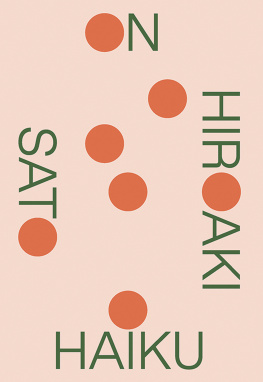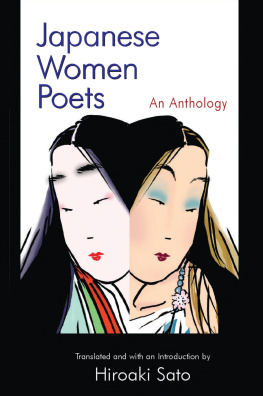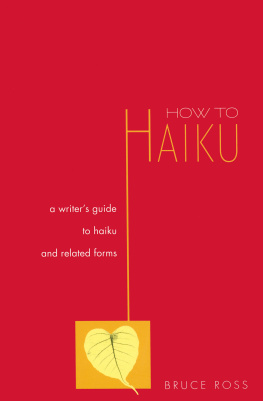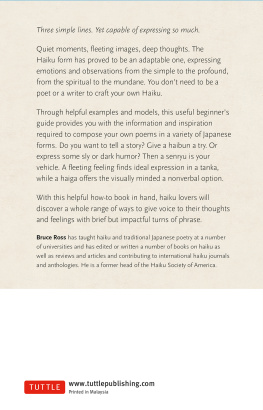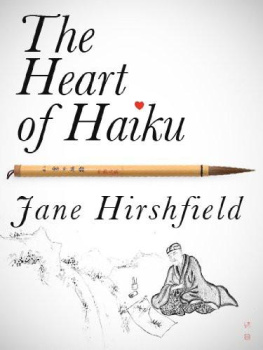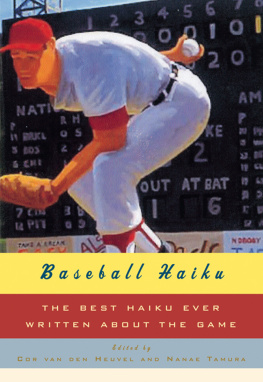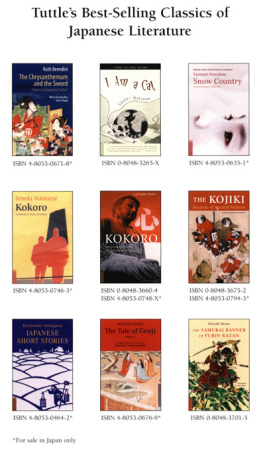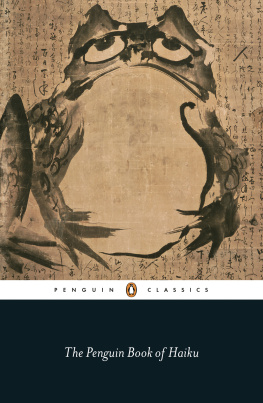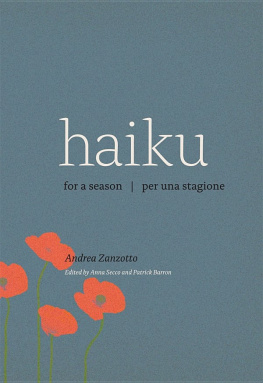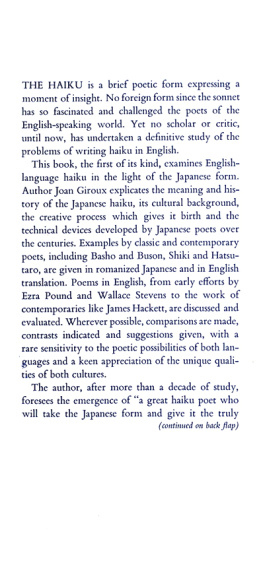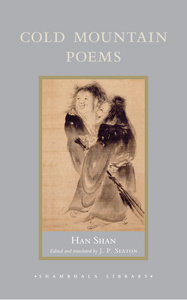On Haiku
Also by Hiroaki Sato
poems
That First Time: Renga on Love and Other Poems
history and criticism
One Hundred Frogs: From Renga to Haiku to English
Snow in a Silver Bowl: A Quest for the World of Ygen
biography
Persona: A Biography of Yukio Mishima by Inose Naoki (adapted and expanded)
compilation
Erotic Haiku
translations, poetry
Spring & Asura: Poems of Kenji Miyazawa
Mutsuo Takahashi: Poems of a Penisist
Lilac Garden: Poems of Minoru Yoshioka
See You Soon: Poems of Taeko Tomioka
Chieko and Other Poems of Takamura Ktar
From the Country of Eight Islands: An Anthology of Japanese Poetry (with Burton Watson)
A Bunch of Keys: Selected Poems by Mutsuo Takahashi
A Future of Ice: Poems and Stories of a Japanese Buddhist by Miyazawa Kenji
Osiris, the God of Stone by Gz Yoshimasu
Sleeping Sinning, Falling by Mutsuo Takahashi
A Brief History of Imbecility: Poetry and Prose of Takamura Ktar
Right Under the Big Sky, I Dont Wear a Hat:The Haiku and Prose of Hsai Ozaki
String of Beads: Complete Poems of Princess Shikishi
Bashs Narrow Road: Spring & Autumn Passages
Breeze Through Bamboo: Kanshi of Ema Saik
Rabbit of the Nether World by Reiko Koyanagi
Not a Metaphor: Poems of Kazue Shinkawa
The Girl Who Turned into Tea: Poems of Minako Nagashima
The Village Beyond: Poems of Nobuko Kimura
Santoka: Grass and Tree Cairn
Runners in the Margins: Poems by Akira Tatehata
Toward Meaning: Poems of Kikuo Takano
The Modern Fable by Nishiwaki Junzabur
Japanese Women Poets: An Anthology
The Iceland by Sakutar Hagiwara
So Happy to See Cherry Blossoms: Haiku from the Year of the Earthquake and Tsunami by Mayuzumi Madoka (with Nancy Sato)
Cat Town by Sakutar Hagiwara
My Purgatory by Inuhiko Yomota
translations, prose
The Sword and the Mind by Yagy Munenori and Takuan Hs
Legends of the Samurai (anthology of old accounts with commentary)
Silk and Insight by Mishima Yukio
My Friend Hitler and Other Plays of Yukio Mishima
The Silver Spoon: Memoirs of a Boyhood in Japan by Kansuke Naka
Copyright 2018 by Hiroaki Sato
All rights reserved. Except for brief passages quoted in a newspaper, magazine, radio, television, or website review, no part of this book may be reproduced in any form or by any means, electronic or mechanical, including photocopying and recording, or by any information storage and retrieval system, without permission in writing from the Publisher.
Useless! Useless!, What is Buddhism?, Prayerbeads, Haiku, schmaiku, and The fly, just as from Book of Haikus by Jack Kerouac, edited and with an introduction by Regina Weinreich, copyright 2003 by the Estate of Stella Kerouac, John Sampas, Literary Representative. Used by permission of Penguin Books, an imprint of Penguin Publishing Group, a division of Penguin Random House LLC. All rights reserved. Any third party use of this material, outside of this publication, is prohibited. Interested parties must apply directly to Penguin Random House LLC for permission.
One-line excerpts from Pastel Sentences (Selections), American Sentences 19951997 from Death & Fame: Last Poems 19931997, by Allen Ginsberg. Copyright 1999 by the Allen Ginsberg Trust. Reprinted by permission of HarperCollins Publishers.
Manufactured in the United States of America
First published as a New Directions Paperbook ( ndp 1426) in 2018
Design by Eileen Baumgartner
Library of Congress Cataloging-in-Publication Data
Names: Sato, Hiroaki, 1942 author.
Title: On haiku / Hiroaki Sato.
Description: First edition. | New York, NY : New Directions Publishing Corporation, 2018. | A New Directions Paperbook Original. | A collection of essays including many haiku translated from the Japanese.
Identifiers: lccn 2018021511 (print) | lccn 2018026919 (ebook) | isbn 9780811227421 (ebook) | isbn 9780811227414 (alk. paper)
Subjects: lcsh : HaikuHistory and criticism. | Japanese poetryHistory and criticism. | Haiku, AmericanHistory and criticism. | American poetryJapanese influences.
Classification: lcc pl 729 (ebook) | lcc pl 729 . s 1887 2018 (print) | ddc 809.1/41dc23
LC record available at https://lccn.loc.gov/2018021511
New Directions Books are published for James Laughlin
by New Directions Publishing Corporation
80 Eighth Avenue, New York 10011
ndbooks.com
Preface
When you are in a foreign country, you are sometimes taken to be an authority of some aspects of your native culture. Thus it was that, just a few years after I arrived in New York City from Japan in 1968, I was asked by two ladies, Carmel Wilson and Eleanor Wolff, to teach haiku to them once a week, and I had the temerity to say yes. As I learned soon enough, they knew more about haiku than they had hinted at the outset, having studied with Harold J. Isaacson, the author of Peonies Kana: Haiku by the Upasaka Shiki, at the New School of Social Research.
Several years after our weekly sessions started, the Haiku Society of America asked me to give a talk on haiku as a translator of modern Japanese poetry. My talk was more negative than positive about haiku, as it was a somewhat unflattering assessment of the genre: the form is too short to make it as a poem on its own, its origins suggest it requires a larger context, and so forth. As an English major in Kyoto during the 1960s, I had not had a high regard for the ephemeral thing. Nonetheless, I was elected president of the society two years later and served from 1979 to 1981. Since then I have translated many haiku, both into English and Japanese, and have had a number of occasions to give a talk or write an essay about the verse formits history; its religious, philosophical, and social backgrounds; its understandings outside Japan, mainly in the United States. And so the contents of this book.
I translate haiku in one line because most Japanese haiku writers, both standard and nonstandard, treat it as a one-line form and adjust its prosody accordingly. There is also a non-haiku genre called one-line poem, ichigy-shi, that came into being in the 1920s, written most notably by Kitagawa Fuyuhiko and Anzai Fuyue. At the same time, there are some who lineate their haiku, as you will see in Gendai Haiku: What Is It?; with them, I am impelled to reproduce those lines in translation. But I am by no means the first to translate haiku in one line; some had done the same before I started doing so, to no discernible ill effect. In recent decades, a fair number of non-Japanese poets have written monolinear haiku, as there have been poets who have written one-line poems. In the mid-1970s, for example, the American poet Bill Zavatsky devoted one of the five issues of Roy Rogers to one-line poems.
I must make it clear that this is not to suggest those who translate haiku into three lines, as most do, are wrong. The prosody may be least transferable into a different language, besides the fact that in English a one-liner suggests a witty or humorous quip. It has long been a tradition to present haiku in non-Japanese languages as tercets, albeit in various numbers of syllables, from 5-7-5, or a total of 17, to poems of just a few syllables.

